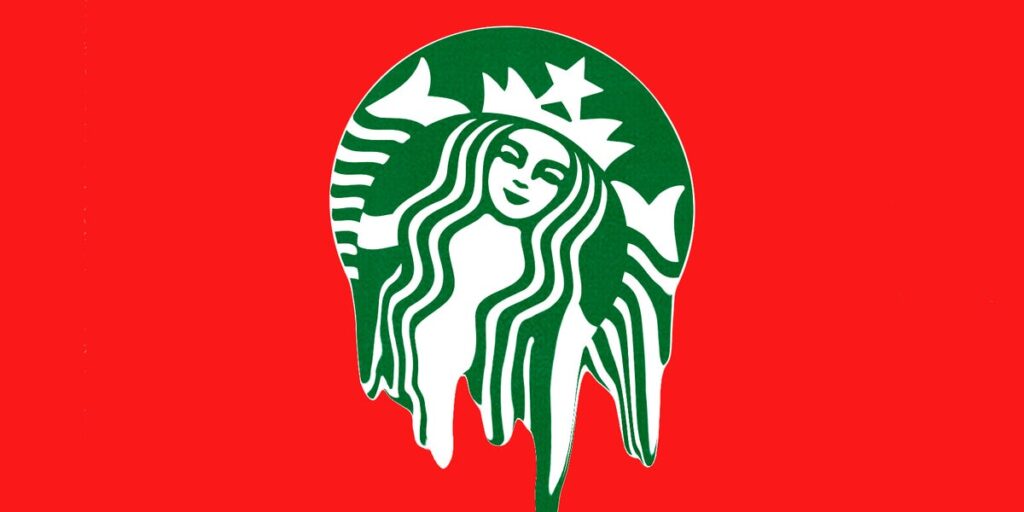Chipotle CEO Brian Niccol is set to take over in September, with current CFO Rachel Ruggeri serving as interim CEO until then.
Narasimhan’s time at the helm was marred by falling sales, labor union clashes and the rise of activist investors.
“Lakshman Narasimhan’s departure as Starbucks CEO is not surprising given activist investors and the company’s steep sales decline over the past nine months, but the appointment of a successor will send ripples throughout the industry,” William Blair analyst Sharon Zackfia wrote in a note.
Here’s what went wrong at Starbucks under Narasimhan’s leadership.
Sales decline
Starbucks has seen same-store sales, a key metric in the restaurant industry, decline. In late July, the company said its global same-store sales fell 3% in the current quarter, after growing 10% in the same period a year ago.
That includes declining sales in its domestic market. U.S. same-store sales fell 2% in the quarter, down from a 7% increase a year ago.
In China, a key growth market, same-store sales rose a robust 46% year-on-year in the fourth quarter before falling 14% year-on-year.
Starbucks has cited a number of reasons for its poor performance. Middle East-related boycotts have led some customers to avoid the brand, but Mr. Narasimhan told investors last month that the cause is “widely discussed misunderstandings about our brand.” He said a tough consumer environment in the U.S. and China have hurt sales due to cautious consumer spending and increased competition.
Starbucks has been exploring various ways to boost sales, including selling bubble teas and introducing bundled deals. Stifel restaurant analyst Chris O’Cull said in a recent note that despite these efforts to boost sales, it’s “alarming” that Starbucks’ U.S. peers saw a 6% decline in transaction volume, only partially offset by a 3% increase in average ticket size.
Activist Investors
Elliott Management, led by founder Paul Singer, has been targeting the coffee giant in recent months. CNBC / Getty Contributor
Narasimhan confirmed in July that activist investor Elliott Management had acquired a stake in Starbucks.
“Our conversations to date have been constructive,” he said at the time.
Starboard Value also acquired a stake in the company, The Wall Street Journal reported Friday.
Starboard Value had asked the company to take steps to boost Starbucks’ depressed stock price through 2024, people familiar with the matter told The Wall Street Journal.
Trade union clashes
Starbucks baristas have been organizing for the past few years, with the Financial Times reporting that the Workers United union represents staff at more than 470 stores in the US.
Starbucks has been at odds with labor unions during Narasimhan’s tenure as the company’s chief.
Last summer, the union accused the company of “hypocritical treatment of LGBTQIA+ employees.” The union told Business Insider that Starbucks had prevented employees in some stores from decorating in Pride décor and had taken down Pride flags. Starbucks said there has been “no change” to the company’s policy regarding Pride Month celebrations.
Starbucks and the union filed lawsuits against each other in October after the union used the company’s name and logo in a social media post declaring “solidarity” with Palestine.
The former CEO continues to attack the company
After more than 23 years at the helm of Starbucks, Howard Schultz isn’t shy about sharing his views on running a company. Stephen Brasher/Getty Images
Howard Schultz, the leader synonymous with Starbucks’ rise, isn’t going to stay quiet.
In a LinkedIn post in May, the longtime CEO said Starbucks needed to focus on customer experience and improve its stores and mobile app to recover from its “loss.”
Schultz, who serves as the company’s chairman emeritus, added that the chain needed to “overhaul” its strategy and strengthen its “premium position.”
“In everything you do, focus on the experience, not the transaction,” Schultz wrote.
In a letter to the chain’s management earlier this year, he said the chain needed to return to its core values and rediscover its “soul.”
In a press release announcing Starbucks’ leadership changes, Schultz didn’t say how long Narasimhan had been with the company, but instead said of Nicol, “I believe he is the leader Starbucks needs at this critical time in its history.”



